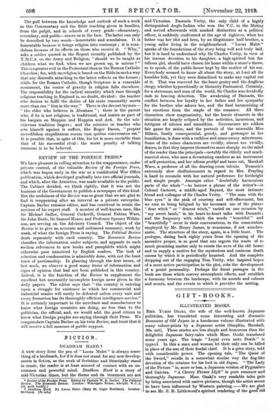FICTION.
DEADHA1v1 HARD.t
A FEW story from the pen of " Lucas Malet " is always something of a landmark, for if it does not stand for any new developments in fiction, as the work of Scriabine and Stravinsky stand in music, the reader is at least assured of contact with an uncommon and powerful mind. Deadham Hard is a story of mid-Victorian times, but the theme and its treatment are not mid-Victorian. Damaris Verity, the only child of a highly distinguished Anglo-Indian who won the V.C. in the Mutiny and served afterwards with marked distinction as a political officer, is suddenly confronted at the age of eighteen, when her father was her idol and hero, by an illegitimate half-brother, a young sailor living in the neighbourhood. " Lucas Malet " speaks of the foundations of the story being well and truly laid, but it is hard to understand why Sir Charles Verity, in view of his intense devotion to his daughter, a high-spirited but fas• tidious girl, should have chosen his home within a stone's-throw, so to speak, of the public-house kept by the mother of his son. Everybody seemed to know all about the story, at least all the humbler folk, yet they were disinclined to make any capital out of it. That was reserved for the baser gentry and the Anglican clergy, whether hypocritically or blatantly Puritanical. Certainly, for a statesman and man of the world, Sir Charles was decidedly rash in braving detection. The awakening of Damaris, the conflict between her loyalty to her father and her sympathy for the brother who adores her, and the final harmonizing of her emotions form the staple of the romance. All three characters show magnanimity, but the heroic elements in the situation are largely eclipsed by the activities, incursions, and intrigues of minxes and mannikins. Governesses are seldom fair game for satire, and the portrait of the miserable Miss Billson, fussily consequential, greedy, and grotesque in her humiliation, is done with a ruthless and unnecessary minuteness. Some of the minor characters are vividly, almost too vividly, drawn, in that they impress themselves more sharply on the mind of the reader than the principals—notably the elderly and muchmarried siren, who uses a devastating candour as an instrument of self-protection, and her odious protege and tame cat, Marshall Wace, a professor of all the drawing-room talents. Damaris's extremely slow disillusionment in regard to Mrs. Frayling is hard to reconcile with her natural preference for forthright and simple people. Amongst other " doubtfully harmonious parts of the whole "—to borrow a phrase of the writer's—is Colonel Carteret, a middle-aged Bayard, the most intimate friend and colleague of Sir Charles Verity. " The man with the blue eyes " is the pink of courtesy and self-effacement, but we own to being fatigued by his incessant use of the phres3 " dear witch " or " dearest witch," varied on one occasion by " my sweet lamb," in his heart-to-heart talks with Damaris ; and the frequency with which the words " beautiful " and " beautifully " occur in their conversations, in the connotation employed by Mr. Henry James, is wearisome, if not anachronistic. The structure of the story, again, is a little loose. The prologue, dating back eighty years from the opening of the narrative proper, is so good that one regrets the waste of sc much promising matter only to create the aura of the old house and to supply a motive for the mysterious and ominous death omens by which it is periodically haunted. And the complete dropping out of the engaging Tom Verity, who inspired hopes of a more active participation in the plot, robs the development of a genial personality. Perhaps the finest passages in the book are those which convey atmospheric effects, and establish a harmony between the landscape, with its sounds and colours and scents, and the events to which it provides the setting.






































 Previous page
Previous page